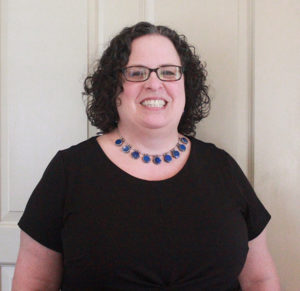Meet the New AHA Staff Member: Nicole Carr

Please welcome the new Director of Development of the American Humanist Association, Nicole Carr!
TheHumanist.com: What is your educational and work background?
I graduated from the University of Pennsylvania with a degree in English and then went on to the University of Virginia to get a PhD and become an English professor. After realizing that a career in academia wasn’t for me, I left UVA after earning an MA in English with a concentration in feminist literature. As I was looking around for what I wanted to do as a career, I lucked into a job as a grant writer with a theater company. Development—essentially fundraising for nonprofits, which was a profession that I didn’t even know existed—ended up being a great fit for me. For about fifteen years I raised money for various arts organizations in Philadelphia and New Jersey. Then I moved to the Washington, DC, area where I worked for over a decade at Ivymount School & Programs, an organization that serves students and young adults with special needs throughout the DC metropolitan area.
TheHumanist.com: How did you first learn about humanism?
I have thought of myself as an atheist for quite a while but—in what I’ve discovered is a fairly typical process—I learned I was a humanist when I first explored the American Humanist Association website and read the definition. Immediately I thought, “Hey, that’s me!”
TheHumanist.com: Did you grow up in a traditional religious faith? How did it impact you?
I grew up, somewhat accidentally, in a relatively liberal Lutheran church. My parents were both brought up as Catholics but were disillusioned by church teachings that they didn’t agree with (including the church’s stance on reproductive rights and the role of women), so they stopped going to church. When my sister and I started school, my parents decided that they wanted us to have some religious background. They started to search for a church where they felt comfortable, going to services around our town. Some friends took them to a nearby Lutheran church, which they found friendly and welcoming, so my family joined. It was actually a lovely, nurturing community to grow up in: Bible stories were taught as metaphorical; no one ever talked about hell; and the congregation was involved in civil rights, social justice, and community issues. We were fairly involved—my father was on the church council, my mother taught Sunday school and helped organize the adult forum, and my sister and I sang in the church choir and participated in youth groups. It wasn’t until I left home for college that I started questioning religion. Slowly, I moved from considering myself religious to “spiritual but not religious,” to an understanding that this life on earth is what we have and we should make the most of it. I came to believe that each person must find ways to make their own lives meaningful and fulfilling and that being and doing good in the world was a big part of instilling that meaning.
TheHumanist.com: What interested you most about working for the American Humanist Association?
After the 2016 presidential election, I wanted to be doing something concrete to support causes I felt were important. Many things I see as core American values—separation of church and state, reproductive health, civil rights, the value of reason and science—are under attack. The AHA’s mission is perfectly aligned with the issues that I care about. I consider myself lucky that I have a professional skill set in raising money that can help the AHA accomplish its mission.
TheHumanist.com: What book has influenced you the most?
In college, just at the point when I was starting to try to figure out my philosophy of life, I read Kurt Vonnegut’s God Bless You, Mr. Rosewater in an English class. I loved it and went on to read everything that Vonnegut had ever written. One of my favorite quotes is from the first one I read. The main character plans a baptismal speech for his neighbor’s twins: “Hello babies. Welcome to Earth. It’s hot in the summer and cold in the winter. It’s round and wet and crowded. On the outside, babies, you’ve got a hundred years here. There’s only one rule that I know of, babies—God damn it, you’ve got to be kind.” When I read that it struck me as a pretty good philosophy of life. And it still does.
TheHumanist.com: If you could have dinner with any three people in the world (living or dead), who would they be and why?
The first two are easy: I would have dinner with my husband (who died a few years ago), my mother (who died when I was in grad school), and—because all three of us were fans of the same writer who I imagine would be a great dinner companion with his wicked sense of humor and vast interests—I would ask Kurt Vonnegut to join us.
